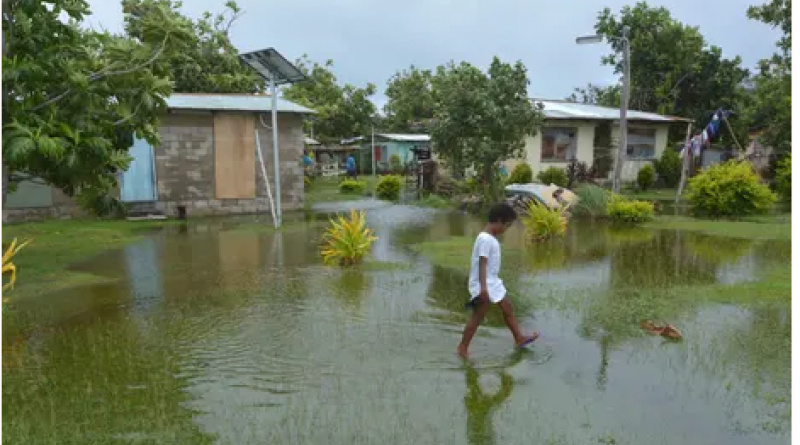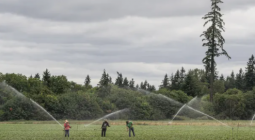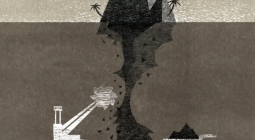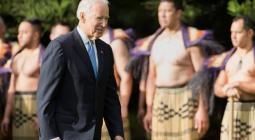Op - Pacific islanders aren’t just victims – we know how to fight the climate crisis

We are resilient in the face of worsening floods and drought, but refuse to accept more failures from world leaders
As I travelled on the train to Glasgow for Cop26 a few days ago, I felt the enormous power of my people and my ancestors around me. I am a Samoan, from one of the regions most threatened by climate breakdown, despite contributing little to emissions. I am at the climate summit to represent the voices of our communities, and of those who could not travel here due to Covid-19 and continuing vaccine apartheid. I bring with me the voices of a Pacific that refuses to give up.
Time is fast running out for my islands, and we will accept no more excuses or failures from world leaders. We know they’re not doing enough – the most recent scientific report by the IPCC has shown us that. Cop26 must deliver concrete solutions urgently, and we are here to force them to act.
On Monday, I told world leaders at the start of the summit “to remember that your meeting rooms and drafting documents are not just black and white objects; to remember that, in your words, you wield the weapons that can save us or sell us out for profit and power”. All that talking could have a real impact across the world. Will the negotiators in Glasgow have the political will to do the right thing, to use the right words and follow them up with long overdue action?
If not, then we have to keep fighting. As a Pacific islander, one key part of my history is the canoe. And you can think of the climate talks as a compass for a journey, indicating directions in the form of ambitious goals and detailed plans that would guide our canoe to safety.
The compass is helpful, but we’re not dependent on it. My ancestors didn’t use compasses to navigate the ocean, and if the summit in Glasgow fails then we, the people, can move the canoe to safety by pushing those in power towards a real course of action.
For hundreds of years my people have been resilient. We fought back against our colonisers and we have made them change. As the rest of the world begins to suffer from the climate emergency as we Pacific islanders already are, we can teach you how to fight back like us.
From the moment the US, Germany and Britain began trying to colonise Samoa, they tried to strip us of our culture. In some sense the colonisers recognised that our knowledge, our beliefs and our way of doing things were where we draw mana – our power – from. That’s why one of the main things we want to say with the Youth4Pacific declaration that we’re bringing to Cop26 is that indigenous knowledge must be respected as a form of climate science.
We fought against the colonisers who tried to burn down our culture and achieved our independence. But now we’re living through a different revolution: we’re resisting climate colonialism, where rich dirty corporations profit from our destruction.
For a decade now, the storms in the Pacific have been getting more violent, the droughts have been longer and the floods deeper. Fishers cannot feed their families. Family-owned shops that are flattened in a cyclone are rebuilt, only to be destroyed by rising water.
All these fights are connected. The climate crisis and social inequities are all symptoms of a world shaped by colonialism and then by capitalism, both of them ways of organising society that value the comfort of one group over the lives of another.
We know that if one part of a canoe is damaged, the whole thing sinks. What is happening now to the Pacific islands is a warning to the rest of the world.
We can show you what is coming, but we can also show you how to survive it. Our resilience means we adapt. When there are hardly any fish, our boats take the risk and go further out. When the winds destroy homes and businesses, the village stops what it’s doing and gets together to fix everything.
But we cannot go on like this, allowing the climate crisis to make our islands uninhabitable. The declaration we’re bringing to Cop26 says that we refuse to leave our islands. Forcing an entire people to migrate so the world’s super-rich can continue burning oil and coal is not a solution. And if world leaders allow this to happen to the Pacific, the rest of the world will be next.
We all know we should be punishing the politicians who fail us. Of course, next time we must tick different names on our ballot papers. But there’s so much more we can do. Join your local grassroots environmental group, a students’ climate association or volunteer programme. This is the kind of organising that can hold those in power accountable after this Cop has ended.
One of the Pacific climate warriors in our group at Glasgow is a dancer – that’s how she spreads the message. Another is an educator doing this work through his students. Another entered a beauty pageant to use it as a platform for talking about climate justice. How you can protect the world depends on who you are.
We are not just victims to this crisis. We are not drowning, we are fighting. Now the world needs to hear us and follow our lead.
-
Brianna Fruean is a Samoan climate activist, student and member of the Pacific Climate Warriors delegation at Cop26
2 November 2021
The Guardian




